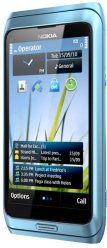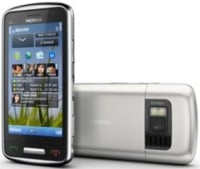Google's Android operating system took 29 percent of U.S. smartphone market share in January, breaking a statistical tie with Apple's iOS and Research In Motion's BlackBerry platforms in growing 2 percentage points from December.
However, Nielsen data also noted that while Android handsets might have a slight edge over the iPhone and BlackBerry-powered gadgets, RIM and Apple lord over other device makers, "since they are the only ones creating and selling smartphones with their respective operating systems."
HTC is third, accounting for 12 percent of Android smartphones purchased, and 7 percent running Microsoft Windows Mobile or Windows Phone 7.
The company, which has been selling the new HTC Shift since January, has a litany of Android sets on tap for 2011 to bolster its lead. These include the HTC Thunderbolt and HTC Merge CDMA world phone.
Motorola was next as a purveyor of Android handsets, as 10 percent of smartphone owners had a Motorola Android device, with only 1 percent still using a Windows-based Motorola phone.
Motorola aims to up its Android market share this quarter with the availability of its Atrix 4g dual-core smartphone on AT&T's network for $199.99. The device plugs into a Motorola Laptop Dock, which consumers may pair with the phone at purchase for $499.
Motorola, which also just launched its Xoom Android 3.0 tablet, is expected to launch its next major Droid smartphone, the Bionic, on Verizon Wireless next quarter.
Samsung, whose Galaxy S devices have sold more than 10 million units since their launch last summer, commanded only 5 percent of Android share, according to Nielsen.
Samsung's last big Android handset offering was the Nexus S, launched on T-Mobile in December. However, the company has the Galaxy S II coming down the pike as media-intensive handsets later this year.
It's important to note that while Android handset makers are busy pumping out stylish new handsets, Apple's iPhone is still the hottest smartphone in the world, shipping more than 100 million units. The company is expected to launch the iPhone 5 this summer.
RIM's BlackBerry device share is lagging, as the company appears focused on its PlayBook tablet more than banging out hot new BlackBerry handsets.
Microsoft Windows Phone 7 is on quite a slower timetable. With handsets launched to AT&T and T-Mobile in 2010, the platform has been slow to catch on. However, Microsoft has landed Nokia as another handset maker on which to put its software, so that platform should ramp by 2012.
However, Nielsen data also noted that while Android handsets might have a slight edge over the iPhone and BlackBerry-powered gadgets, RIM and Apple lord over other device makers, "since they are the only ones creating and selling smartphones with their respective operating systems."
HTC is third, accounting for 12 percent of Android smartphones purchased, and 7 percent running Microsoft Windows Mobile or Windows Phone 7.
The company, which has been selling the new HTC Shift since January, has a litany of Android sets on tap for 2011 to bolster its lead. These include the HTC Thunderbolt and HTC Merge CDMA world phone.
Motorola was next as a purveyor of Android handsets, as 10 percent of smartphone owners had a Motorola Android device, with only 1 percent still using a Windows-based Motorola phone.
Motorola aims to up its Android market share this quarter with the availability of its Atrix 4g dual-core smartphone on AT&T's network for $199.99. The device plugs into a Motorola Laptop Dock, which consumers may pair with the phone at purchase for $499.
Motorola, which also just launched its Xoom Android 3.0 tablet, is expected to launch its next major Droid smartphone, the Bionic, on Verizon Wireless next quarter.
Samsung, whose Galaxy S devices have sold more than 10 million units since their launch last summer, commanded only 5 percent of Android share, according to Nielsen.
Samsung's last big Android handset offering was the Nexus S, launched on T-Mobile in December. However, the company has the Galaxy S II coming down the pike as media-intensive handsets later this year.
It's important to note that while Android handset makers are busy pumping out stylish new handsets, Apple's iPhone is still the hottest smartphone in the world, shipping more than 100 million units. The company is expected to launch the iPhone 5 this summer.
RIM's BlackBerry device share is lagging, as the company appears focused on its PlayBook tablet more than banging out hot new BlackBerry handsets.
Microsoft Windows Phone 7 is on quite a slower timetable. With handsets launched to AT&T and T-Mobile in 2010, the platform has been slow to catch on. However, Microsoft has landed Nokia as another handset maker on which to put its software, so that platform should ramp by 2012.
















































